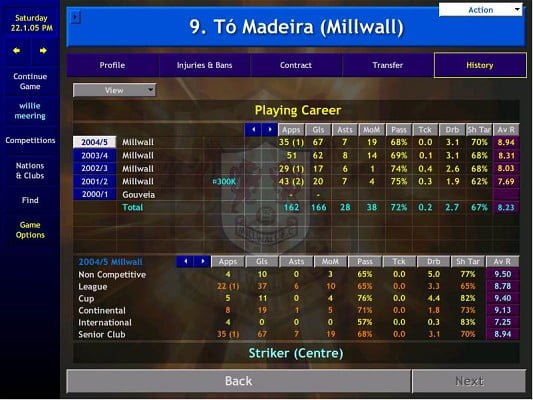If you’ve ever spent the best part of a week taking Chester City from the Conference to the Champions League, then you’ll know just what a cultural giant Football Manager has become.
I still regularly play the 2001/2002 version, widely regarded as the high point of the virtual manager series, where the likes of Cherno Samba and Tonton Zola Moukoko sign mega-deals with the Madrid’s and Manchester’s of the world despite their obscure and relatively disappointing real-life careers.
As a means of passing time, FM is second to none. Where else can you spend hours on end polishing rough diamonds into flourishing gems after picking them up for peanuts from the Swedish under-21 side? On what other platform could you lead an unfancied Rotherham United to FA Cup glory by somehow persuading the fictional goalscoring machine To Madeira to lead the line up top?
It is a fantastic franchise that has blossomed into a bona fide tool for scouting players, in both a virtual sense and one reflected in reality. The most recent incarnation of the game was reportedly used by Premier League teams to find out information on player attributes and statistics that they would have had to put serious man hours in to discover. It has changed the face of football gaming and has now began to infiltrate the sport itself.
It became a conundrum. How could you win the league in Finland, spend as little money as possible AND keep Nicolas Anelka happy for an entire season? I’m certain that the early years spent honing the key decision-making skills set many people up for life.
How many video games have had such an impact? There must be few, especially sports games, that have spawned so many online super leagues, blogs, podcasts and dedicated websites.
There was even a documentary made about the phenomenon, with stories and testimony from it’s avid fans about the game being such a major part of their lives, as if they really were Football Managers.
I was so happy when I found out that CM 01/02 was available to download, legally, for free. It was a game I first played when I when about nine years old. Back in those days, Michael Owen was my favourite footballer and my team, Grimsby Town, were punching above their weight in what is now the Championship. I couldn’t then, and still can’t now, bring myself to do a Grimsby Town save simply because I’m scared that the season would end in relegation and having seen one in real-life, I wouldn’t want to revisit those emotions.
What about the legends of the game? Alongside the greats, there have been many players that are famous simply for being wonderkids, world-beaters and wasted talents. Whenever I think of Football Manager (or Championship Manager pre 2005) I can’t help but imagine Mark Kerr dominating the midfield of the best club sides in the world, even though he was a fair-to-average player for Scottish side Falkirk. I envision Maxim Tsigalko, a Belarusian bruiser of a centre-forward, with a goals-to-game ratio that borders on the ridiculous. Stick him up front for Bournemouth or Barca and the result was the same- score, score, score.
It is this sense of community within the game that appeals to many. There are countless YouTubers that make a living from uploading their FM saves and keeping the game alive. Through the various message boards, statistical discussions that are as detailed as they are geeky, the utopia of togetherness is evident more in FM than, in my opinion, FIFA, where the sense of beating someone by seven clear goals leads to abuse and trolling.
Just for fun, do feel free to send me your All-Time Football Manager XI, and no doubt the community will rate, discuss and dissect your options with good faith, temperament and reminiscence.









